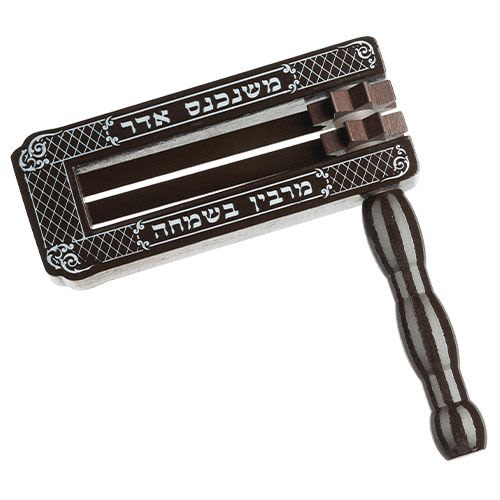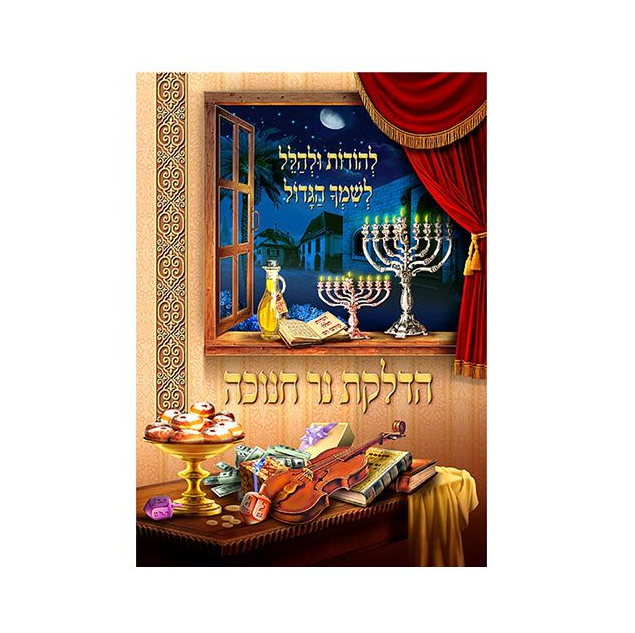
Entrance-Level Emuna
Our powers of comprehension and cognizance become greatly enhanced when we realize that our lives began long before we're born and continue long...

The Zohar explains that entrance-level emuna is the cognizance of a world to come, far beyond the limited material world. An emotionally healthy person isn’t prepared to do anything that is not beneficial or that doesn’t serve a purpose. For example, if you ask someone to raise and lower their hand for sixty minutes for no apparent reason, they’ll certainly refuse. Even if you offer them a fair hourly wage to fulfill you’re request, they still might not consent if they don’t see a purpose to what they’re doing. If a human does things for a purpose only, then you can rest assured that Hashem does nothing without a specific and very good purpose.
Did Hashem create such a magnificent universe – from the tiniest one-celled amoeba to the greatest galaxies – just for the fun of it? Of course, not! Every mineral, plant, animal, and human has an important task to perform in the overall scheme of creation. Hashem gave the human fabulously sophisticated components – intellectual potential, physical capabilities, and spiritual power – for a definite purpose.
We must therefore ask ourselves: "Am I here for the gratification of my body! The body is destined to ultimate decay in the grave! Why would Hashem create me with such a sophisticated spiritual and emotional apparatus if I were meant just to work like a mule all my life, then die, and then become dinner for the worms? My body, with all that I’ve invested in it – the spa, the hairdresser, the massages, the beauty treatments – ends up as fertilizer for the flowers.
It’s a harsh realization, but it’s true. Is that all there is to life? Certainly not. Hashem wouldn’t have given us a soul – our spiritual self – without a purpose. We can therefore surmise that there must be a continuation of spiritual life far beyond physical demise. We toil in this world, and reap the rewards in the world to come.
Reward and punishment manifest themselves in this world as well. A person achieves a sense of content, fulfillment, and inner peace when he or she does Hashem’s will. Inversely, transgressions of Hashem’s will lead to tribulations in life – not as punishment per se, but to stimulate soul-searching and to help a person make the right choices – for the ultimate and eternal benefit of his or her soul.
Without a post-physical world, a grand scheme of reward and punishment is superfluous.
Tikkunim
The belief in a world to come is the basis of genuine emuna, providing an explanation to many of life’s perplexities. Our powers of comprehension and cognizance become greatly enhanced when we realize that our lives began long before we’re born and continue long after we die.
Here’s a true story about a tragedy that jolted the very foundation of an entire Jewish community’s emuna in Hashem:
A beautiful young lady – daughter of one of the community’s most prestigious and respected families – married a righteous merchant, a man of charity and compassion. The early years of their marriage were blessed with happiness, abundance, and children. The modest wife became a wonderful mother, utilizing every free minute from her busy schedule to recite Psalms or to care for the community’s poor and underprivileged. The husband, whose successful commerce carried him to surrounding cities and hamlets, never failed to fulfill a strict daily quota of prayer and Torah learning. In addition, he gave enormous amounts to charities all across the country, easing the suffering of thousands of impoverished people.
Suddenly, disaster struck in the home of the righteous couple! Their home – a bright beacon of charity, good deeds, and lovingkindness – became the scene of agony. A drunken soldier viciously abused, mutilated, and murdered the couple’s three-year-old son, heaven forbid!
The entire community was appalled. Thousands joined in the mourning, including the nation’s leading sages and spiritual leaders. No one understood. Many vocalized the doubts in their hearts in public: Is this the reward that such a righteous couple deserves? Why did Hashem do something so horrendous to them?
Why did the poor little toddler have to suffer so severely? Others harbored malice in their hearts against Hashem that weakened their emuna and distanced them from Torah.
The couple reacted with total emuna, capitulation, and loving acceptance of the divine decree. They continued with their righteous lifestyle as if nothing had changed – the wife with her acts of lovingkindness and the husband with his Torah learning and magnificent charity.
Shortly thereafter, tragedy struck again: Like wildfire, word spread around the town that the righteous merchant had fallen deathly ill. All of the local synagogues mobilized their members in round-the-clock prayer vigils. Everyone loved the merchant, and almost every person in town had benefited from his generosity at one time or another. Understandably, the cries of the
Community pierced the very thresholds of the heavens.
The community beadle ran breathlessly into the
town’s main synagogue, where the head rabbi prayed, and shouted, "The doctors have given up hope! They say the end is near!"
The head rabbi, himself a pillar of righteousness and a learned master of Talmudic law, declared forcefully but calmly, "It shall not happen! No evil shall befall our brother the righteous merchant!"
The pain and bewilderment of the entire town reached new heights when the word of the righteous merchant’s death became common knowledge. Such a young man, at the prime of life – didn’t he suffer enough? He did nothing but good deeds his entire life, is this what he deserved? The tears of the young, barely thirty-five year old widow tore at the community’s already perplexed and agonized heart.
A few years passed. One Friday afternoon, the newly married son of the young widow came to wish his mother "Shabbat Shalom"; she tried to smile, but burst into tears.
"Mama," the young man pleaded, "three years have passed already. You’ve cried enough! Our sages prescribed set times for mourning. If someone cries more than they should, then sorrow never leaves them! We are believers; none of us can know Hashem’s considerations. Everything Hashem does is for the very best! Mama, your crying not only saddens us – your children – but it saddens Papa’s soul, too. The matchmakers have been chasing after you with several good proposals, and you’ve been avoiding them. Mama, please, you must continue on with your life."
The young widow took a deep breath. Enough! She made firm resolve to overcome the sorrow. An encouraging thought flashed across her mind: "Am I more merciful than Hashem? Of course, not! I’ve always trusted Hashem, so why shouldn’t I be happy?!" To the relief of her worried children – that very Shabbat – Mama became a new person.
For the first time in years, the widow slept soundly and peacefully. She realized that a lack of emuna – not her husband’s absence – was responsible for the gap in her heart. Now, that gap was filled again.
She had a dream… She saw herself standing in an exotic garden of supernatural beauty, and she understood that this must be the next world. Standing among the aromatic flowering trees, she saw an image of an old man with a long beard, who radiated brilliantly. He approached her, and asked if she’d like to see her deceased husband. She nodded in the affirmative. He led her to a magnificent palace where a young man was giving a Torah lecture to thousands of elderly righteous souls. When the lecture was over, the lecturer approached her – it was her husband!
"Dearest husband," she exclaimed, "why did you leave me alone at such an early stage in our lives? How have you become the teacher of so many tzaddikim? You were a merchant and an upright man, but you were never a Torah scholar."
The husband smiled. "In my former life, I was a great scholar, but I never married. When I died, I was told that I can’t assume my designated place in the upper palaces of heaven because I never fulfilled the first commandment of the Torah, namely, that one must be fruitful and multiply. Therefore, I was reincarnated again for the sole purpose of marrying and having children, and to raise them in the path of Torah. That’s exactly what I did. As soon as I completed my tikkun – my soul correction and my mission on earth – I no longer had to remain down there. Now, as you see, I live a life of eternal bliss…"
"Then why did our little son die?" probed the wife.
The husband answered, "He is the lofty soul of a holytzaddik, an extremely righteous individual. In his previous life he was kidnapped at birth and raised on the milk of a gentile surrogate mother. Finally, at age three, he was redeemed by the Jewish community and subsequently became a sage of enormous spiritual proportions. After his death, he was denied his rightful place in heaven since his early childhood had left a tiny blemish on his soul. His sole tikkun was to return to earth, to be born, nursed, and raised for three years by an upright Jewish woman; you, dear wife, were granted the privilege of being that woman!"
"But why was his death so horrible?"
"Know," continued the husband, that since our toddler son had completed his tikkun, he was destined to die anyway. At the same time, the heavenly court had decreed – in light of the dire sins between man and fellow man in our town – that all its inhabitants be destroyed in a catastrophic pogrom. The righteous soul of our little one volunteered to die a terrible death as atonement for the entire town. As a martyr and as a public atonement, no one is allowed to reach his lofty abode except for me, since I was his father. When your time comes, you – as his mother – will also be allowed. You can’t imagine the bliss of the divine light that surrounds our son…"
The husband faded away. Before he departed, his voice reverberated, "Only be virtue of your reinforced emuna was I revealed to you! As long as you were in a cloud of sadness, you almost lost another child. All my requests to be revealed to you were refused…my tikkun is over, but you still have much to do. Go, remarry, and life a life of emuna and joy. Go with my blessing…farewell!"
The husband’s image disappeared completely.
The widow awakened. She felt like she was born anew. She realized that her questions – as well as the rest of the town’s questions – were needless. If the Torah teaches that Hashem is righteous and just, then there’s no need to wonder why Hashem does what He does.
Those of us who don’t merit revelations in our sleep should strive to strengthen our emuna. The knowledge that Hashem does everything for our eternal benefit should be engraved on our hearts and minds.













Tell us what you think!
Thank you for your comment!
It will be published after approval by the Editor.